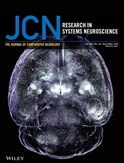Alumni News
Dr. Michelle Bedenbaugh

Dr. Michelle Bedenbaugh recently accepted a position as an Assistant Professor at the University of Florida in Gainesville, FL. Dr. Bedenbaugh earned her Ph.D. with Dr. Hileman after which she undertook postdoctoral training with Dr. Richard Simerly at Vanderbilt University. Her laboratory investigates neural circuits that drive feeding, stress and other motivated behaviors. To do this, she utilizes molecular genetic tools to visualize, record and modulate neural circuits to gain a holistic view of how neural circuit architecture influences behavior and physiology. Her scientific inquiry is driven by a strong interest to investigate how these neural circuits function in adults as well as how developmental perturbations during critical periods of development can alter the programming of these circuits and have lifelong health effects.
_______________________________________________________
Dr. Casey Nestor

Dr. Casey Nestor recently accepted an Associate Professor position at Colorado State University, moving his laboratory from North Carolina State University. His research is supported by an NIH grant and he recently received an additional NIH R01 in collaboration with Drs. Michael Lehman (Kent State University) and Robert Goodman and Stan Hileman here at WVU. Further, he recently received funding from the USDA in collaboration with Dr. Yves Boisclair (Cornell University). Dr. Nestor’s research is focused on acquiring a greater understanding of the mechanisms that link reproduction and energy balance at the level of the brain. His ongoing studies focus on central mechanisms whereby inadequate energy intake (i.e. undernutrition) suppresses gonadotropin-releasing hormone/luteinizing hormone (GnRH/LH) secretion in sheep. Specifically, he examines key reproductive neurons (e.g. KNDy cells) in relation to changes in melanocortin signaling and central inflammation during chronic undernutrition in young male and female sheep.
_______________________________________________________
Dr. Allison White

Dr. Allison White earned her PhD in 2023 as a CIP student in Dr. Vince Setola’s laboratory. She recently started working as a postdoctoral associate at The Scripps Research Institute in San Diego. Allison was awarded an NIH Diversity Specialized Predoctoral to Postdoctoral Advancement in Neuroscience (D-SPAN) K00 award to study the effect of chronic alcohol exposure on astrocyte signaling. She will specifically be investigating the significance of astrocytic gap junctions in regulating alcohol drinking and neuronal excitability using a mouse model of alcohol use disorder.
.
_______________________________________________________
Dr. Eliana Aerts

Dr. Aerts completed her PhD here in the laboratory of Dr. Stan Hileman. Her dissertation project centered around investigating what neuronal circuits are important for pubertal timing using sheep as a model animal. She subsequently accepted a postdoctoral position at Oregon Health and Sciences in the laboratory of Dr. Matt Butler to study the effect of mistimed feeding on reproductive outcomes. Her main area of interest is the connection between nutritional and reproductive neuroendocrine circuitry, with a focus on investigating the link between obesity and infertility.
.
_______________________________________________________
Dr. Amber Mills

Dr. Mills recently received her PhD in the laboratory of Dr. Mark Olfert. She subsequently accepted a postdoctoral position at the University of Pittsburgh in Dr. Sharon George's laboratory investigating the impact of cardiac toxicity induced by chemotherapy using optical mapping. She recently was awarded a T32 appointment in the Cardiology Department at the University of Pittsburgh.
.
_______________________________________________________
Dr. Krista Garner

Dr. Krista Garner completed her PhD from WVU in 2022 under the mentorship of Dr. Tim Nurkiewicz and Dr. Lizzie Bowdridge in the Cellular and Integrated Physiology Program. Shortly after, Krista began working for Leidos Biomedical as a Scientist supporting the Developmental Therapeutics Program within the Division of Cancer Treatment and Diagnosis at the National Cancer Institute (NCI). Krista’s training in toxicology was instrumental in landing a position in the Investigative Toxicology Laboratory (ITL). Investigative Toxicology is a vital component of drug development programs that supports early safety decisions in the pharmaceutical industry. ITL develops in vitro models and assays to generate deeper insight about cellular toxicity of novel therapeutic agents, applies mechanism-based approaches to characterize and aid in selection of drug candidates, and investigates on-target/off-tumor and off-target effects to understand and evaluate the safety of innovative cancer therapies. The research and training Krista received at WVU positioned her perfectly to be a key scientist in the ITL at the NCI. Krista enjoys the challenge of learning new state-of-the-art technology platforms, cell models, and assay development.
_______________________________________________________
Dr. Rick McCosh

Dr. Rick McCosh recently joined the faculty in the Department of Biomedical Sciences at Colorado State University, in Fort Collins, CO. He received his PhD in the CIP program in 2017 under the guidance of Dr. Bob Goodman. His recent work is funded by an NIH K99/R00 award and is focused on characterization and functional testing of neurons in the brainstem that regulate reproduction and stress responses. The long-term goal of his work is to understand the neural of regulation of luteinizing hormone secretion, and how the secretion of this important hormone is suppressed during stress using sheep, mouse and cell culture models.
_______________________________________________________
Dr. Michelle Bedenbaugh


Dr. Michelle Bedenbaugh, a former Ph.D. student in CIP with Dr. Stan Hileman, recently published two papers on her postdoctoral work at Vanderbilt University. The first, “MC3R links nutritional state to childhood growth and the timing of puberty,” was published in Nature in November 2021. Research teams from the University of Cambridge, University of Michigan, Vanderbilt University, and others collaborated to discover that the melanocortin-3 receptor (MC3R) regulates the timing of sexual maturation, the rate of linear growth and the accrual of lean mass in humans and mice. Humans that have loss of function mutations in MC3R exhibit delayed puberty and reduced linear growth. Additionally, MC3R is present in neurons known to play a critical role in sexual maturation and growth, including kisspeptin and GHRH neurons in the arcuate nucleus of the hypothalamus. Therefore, MC3R is a crucial modulator of the central melanocortin system and its involvement in growth and sexual maturation. The second manuscript, “Organization of neural systems expressing melanocortin-3 receptors in the mouse brain: Evidence for sexual dimorphism” earned an image on the cover of the Journal of Comparative Neurology in June 2022. In this work, the expression of MC3R neurons and terminals was characterized in the whole brain. In addition to MC3R being expressed in brain areas known to play a role in food intake and energy homeostasis, MC3R was abundantly expressed in areas known to modulate many motivated behaviors, including ingestive, reproductive, defensive and arousal behaviors. Moreover, MC3R expression was sexually dimorphic in several areas, indicating that MC3R may influence sexually dimorphic physiological functions and behaviors. Dr. Bedenbaugh also recently received a perfect impact factor score of 10 on her recent K99/R00 resubmission
_______________________________________________________
Dr. Joshua Gross

Dr. Joshua Gross, a former Ph.D. student in CIP with Dr. David Siderovski and Dr. Vince Setola, published a recent paper in the Proceedings of the National Academy of Sciences (Mar 8;119(10):e2112397119, 2022). Teams from Duke University and the National Center for Advancing Translational Sciences reported the discovery, synthesis, and characterization of a novel functionally selective agonist (N8279) of the cognate G protein-coupled receptor (GPCR) for ghrelin, the GHSR1a receptor. Ghrelin affects the firing rate of dopaminergic neurons and the subsequent release of dopamine in the striatum, thereby influencing such behaviors as reward seeking and locomotion. The authors demonstrated that N8279 is brain penetrant and, at low doses, affects such dopaminergic behaviors as locomotion in a mouse genetic model of hyperdopaminergia and locomotor sensitization to cocaine. The latter behavioral effect of N8279 is notable, as the compound markedly delays the induction of locomotor sensitization to cocaine and abrogates the expression of locomotor sensitization to cocaine. Further preclinical and, if warranted, clinical studies of N8279 should be quite informative as to whether the novel compound has selective efficacy on dopaminergic neurotransmission that is dysregulated in such disorders as SUD and/or Parkinson's disease.